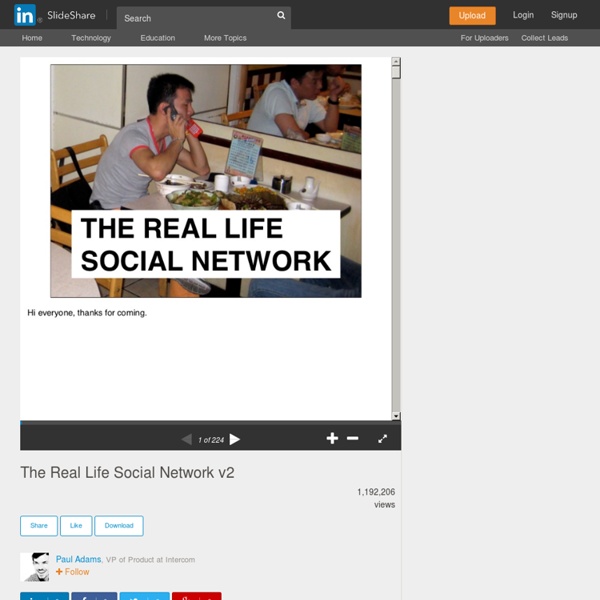



http://www.slideshare.net/padday/the-real-life-social-network-v2
Social Network Wars: How The Five Major Platforms Stack Up [INFOGRAPHIC] Most people don't have the social steam to power a presence on Google+, Facebook, Twitter, LinkedIn and Tumblr. Sure, there are handy apps like Twitterfeed and Hootsuite that can help spread one post to all of your networks, but that ignores the individual strengths and weaknesses of each platform. When it comes time to pick and choose where you post, this chart can help you decide what's appropriate for you. Why Developers Won’t Quit Facebook: Glassdoor Grows Registered Users 10X in 90 Days By Sarah Lacy On August 23, 2012 Like the arid Oakland hills, the blogosphere has spent the summer ablaze with developer anger, as it dawns on everyone what it means to build a company dependent on someone else’s platform. News flash: They have you by the cojones. But the reality is Twitter can put up as many two-by-two matrixes as it likes; Dalton Caldwell can write flame posts on Facebook’s untoward intentions with developers all day long.
social-media-propaganda-posters from mymodernmet.com Etsy merchant Justonescarf from Feeding Hills, Massachusetts has made some pretty awesome social media propaganda posters that will make you think twice about which sites you spend the most time on. Are you always going back and forth between Facebook and Twitter? Have you started to use Google +? How Your Wireless Carrier Overcharges You When your wireless carrier charges you for the amount of data you used on your cell phone in a given month, how do you know the bill is accurate? It very well might not be, according to a new study. This question is more important to consumers than ever. Bridging the Generational Tech Gap - Great Colleges to Work For 2011 By David D. Perlmutter Over the last two years, our department of journalism and mass communication has hired five new tenure-track faculty members.
Research: Mobile Web Ads Beat Apps Consumers engage with mobile Web advertising significantly more than they engage with advertising on ad supported apps, according to statistics for the month of April included in Jumptap’s Simple Targeting & Audience Trends (S.T.A.T.), a monthly report that examines trends in mobile advertising. The report, which is based on information culled from Jumptap’s ad network, indicated that more than 58 percent of mobile internet users are engaging with ad content through their browser versus 42 percent from ad-supported apps. The research seems to suggest that although applications may be a good way to reach a company’s most loyal customers, they may not be the best way to engage a more casual consumer.
How many friends do you have? « Paola Tubaro's Blog Pollet, T., Roberts, S., & Dunbar, R. (2011). Use of Social Network Sites and Instant Messaging Does Not Lead to Increased Offline Social Network Size, or to Emotionally Closer Relationships with Offline Network Members Cyberpsychology, Behavior, and Social Networking, 14 (4), 253-258 DOI: 10.1089/cyber.2010.0161 I recently happened to read this new article (access here). The End of the Facebook Like Bubble There’s a new reality for brands in the digital space, and they’re finding out they’re not the ones holding the cards, especially when we’re talking about Facebook. In September, Facebook tweaked its newsfeed algorithm, a move that raised concerns it was putting the hurt to brands by cutting the number of messages that go through to their fans. This would figure, critics said, since Facebook’s ad model is dependent on brands paying to get more of their messages in front of their audience. Perhaps more importantly, brands are starting to realize they don’t call the shots in the digital world, like they do with other media. Now, they have to adjust their expectations and even their approaches to play in the digital waters, and still it won’t be enough to get a free ride anymore, no matter what some social guru says about “creating engaging content.”